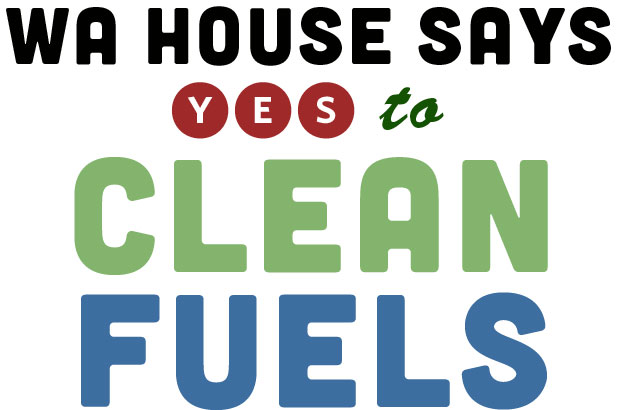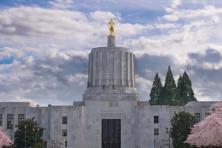The heat is now on the Senate as the House passes a Clean Fuel Standard for the third year in a row
OLYMPIA, WA -- The Washington State Legislature’s effort to enact a statewide Clean Fuel Standard kept rolling with the House of Representatives passing HB 1091 (Clean Fuel Standard) by a vote of 52-46. This is the third year the House chamber has voted in support of the policy. The Senate now takes up this critical legislation where pressure mounts for the chamber to pass major climate policies this year. Over two-thirds of Washington voters support a Clean Fuel Standard.
“We owe it to future generations to protect the climate, improve our air quality, and create jobs in the biofuels industry,” said State Representative Joe Fitzgibbon (34th), the bill’s prime sponsor. “Let this be the year to say we took action, and along the way we created new jobs - good jobs in our farms and forests. Along the way we reduced air contaminants that harm human health, particularly in communities near highways and roadways.”
HB 1091, the Clean Fuel Standard, cuts air pollution by requiring cleaner transportation fuels to power vehicles and invests in communities most impacted by transportation pollution. Transportation pollution is Washington State’s largest source of air pollution linked to asthma, lung cancer, and other respiratory diseases. Burning fossil fuels releases various kinds of particulate matter and pollution in the air, including microscopic, ultrafine particles so small that they get deep into our lungs and bloodstream. This pollution causes serious health problems, like premature death in people with heart or lung disease, aggravated asthma, decreased lung function, increased coughing and difficulty breathing. It is now even more urgent to address, with links to likelihood of complications from COVID-19 and “smoke seasons” now happening statewide the last several summers from wildfires raging across the region.
“I represent the most diverse district in the state. . .[and] my district has the worst air quality. . .between two highways and three airports,” stated State Representative Kirsten Harris-Talley (37th) during debate on the bill. “The largest killer of our children is asthma, and no one dies from it more than Black children. . . Skyway, in my district, has the highest concentration of Black families. Their children suffer from asthma at higher rates than anywhere else. This expands an opportunity for innovation, [it] opens up opportunities in the state, in rural areas outside of my urban area. . . What an amazing thing to be able to expand the green job opportunities in our state and also keep our neighbors safe. . . I am ecstatic to vote for this bill.”
A majority of the House rejected multiple amendments to attempt to weaken the policy and even nullify it. They accepted a few bi-partisan amendments to clarify the bill details and to better harmonize Washington’s Clean Fuels Program with other states who already have it in place.
“A company from Iowa built a facility in a corner of my district,” State Representative Mike Chapman (24th) said during the debate before passage. “They provide a great [biofuels] product, and then they put it on trucks and ship it to Oregon and California. By creating this policy in Washington State, I’m convinced they can expand their operations and create more jobs. This is the quintessential policy for what is good for the environment and good for jobs. Those workers will hear from me that I respect them and the work they do. I'm voting for this because I want to tell them--I've got your back.”
Supporters include unions like IBEW, UFCW 21, medical professionals and health associations including the Washington Health Climate Alliance, the Port of Seattle and Northwest Seaport Alliance, King County Metro, Tacoma Power, Chargepoint, the Electric Vehicle Charging Association, Neste, Generate Capital, and the Alliance for Automotive Innovation, along with many others.
“This will help us grow and build our economy. . . A [Low Carbon Fuel Standard] will create jobs and grow our economy with the development and distribution of biofuels, sustainable biofuels,” said State Representative Vandana Slatter (48th)
Requiring cleaner fuels and electricity for transportation is a necessary component of meeting Washington State’s updated carbon emissions reduction targets that the Legislature set into law last year, and is the baseline for creating pathways toward cleaner transportation options, such as expanded electric vehicle infrastructure, electric vehicle car sharing programs, and investments in renewable sustainable biodiesel and renewable (not fossil) bio-gas.
Representative Alex Ramel (40th) noted that 90% of the refining in Washington happens in his district and the district directly to the north. “Many of the thousands of people who operate those refineries, who maintain them, who do work to upgrade them, are my constituents,” he explained. “I’m voting yes today for those people and for those jobs… A proposed renewable diesel facility [in my district] would’ve created about 100 jobs [but] they moved to California because California has a market for clean fuels and Washington does not. So I’m voting yes today to create a market for clean fuels here. To create an economy for good union jobs.”
Many other representatives spoke in strong support of passing the bill, notably:
“We talk a lot about our kids, what we want for them - a good education, fulfilling jobs, happiness, health - but at the bare minimum, what we owe them is a livable planet. And telling them that it’s too hard, too expensive, isn’t going to fly. All the excuses in the world won’t matter if we fail to deliver them a livable planet.” -State Representative Davina Duerr (1st)
“I'm fed up with being told to wait to save our planet. I'm fed up with polluters putting up more and more obstacles to action. I am fed up with delay.” -State Representative Liz Berry (36th)
“Let’s take action. Let’s harness the amazing entrepreneurial spirit we have in our state. Let’s all be futurists, but not just discuss possibilities of the future. Let’s act today to allow our children and future generations to live and thrive here in Washington.” -State Representative Tana Senn (41st)
The vote came the same week as a kickoff in the International District in Seattle to recognize restaurants who are part of the circular clean energy economy by having biofuels companies collect their used cooking oil to be blended into sustainable biodiesel. Thousands of Washington restaurants are part of the collection program.
In addition to HB 1091, the Legislature is considering several critical complementary policies this session to address climate change including cutting pollution from the building sector, clean and just ways to fund transportation, prioritizing environmental justice (HEAL Act) and investing in a just recovery. Because the Legislature took no meaningful action last year to make major cuts to pollution, the imperative to cut emissions from several sectors is more urgent than ever.
###
FACT CHECKS: More resources for countering confusing information, including misinformation on costs and the program in California are available.
This is a join statement from the Clean Fuels Coalition and the Environmental Priorities Coalition.
ABOUT THE CLEAN FUELS COALITION
Hundreds of organizations, local elected officials and jurisdictions, health associations and hospitals, small businesses, unions and advocacy groups support clean fuels and have been working for several years to see the solution come to Washington. Many supporters also have a presence in Oregon, where the policy has been law for years and where Gov. Kate Brown doubled the standard in 2020. @cleanfuelswork cleanfuelswork.com
ABOUT THE ENVIRONMENTAL PRIORITIES COALITION
The Environmental Priorities Coalition is a network of over twenty leading environmental groups in Washington state that influence policy at the state level. For over a decade, the Coalition has selected joint priority issues to work on during the legislative session to help focus environmental community resources and best achieve our shared goals. @epctweets environmentalpriorities.org




